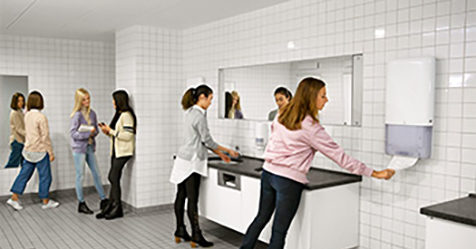What causes the persistent restroom odor that just won’t go away, regardless of the cleaning chemical used or the cleaning process applied? Well, it depends on the type of odor gracing our noses.
There are two types of restroom odors that cleaning professionals encounter while on the job: transient and resident. A transient odor, commonly known as a temporary malodor, occurs when someone uses the restroom for a bowel movement. The odor is likely to be temporary and will dissipate quickly if there is excellent air movement in the restroom. A resident odor is caused by bacteria. Most of the time the bacteria are caused by urine residue located on the floor surface underneath and around toilet bowls and urinals, penetrating into the pores of the floor’s surface.
It is imperative to identify the type of restroom odor before attempting to apply a solution, as each type of odor requires a specific treatment. Below are resolutions for both types of odors.
Transient (Temporary) Odors
Plan of attack: The first option is to use an air freshener to cover up the temporary offensive odor. However, the best resolution is to increase the airflow, if possible. This is a more desirable resolution than using deodorants or maskers, and it will quickly evacuate any offensive odors.
Instructions: Increase airflow for transient odors by opening windows and using exhaust fans. However, if windows and exhaust fans are not available, use deodorants or maskers in the restroom to manage stagnant air.
Preventative measures: Consistent movement of air is the best preventative measure for transient odors. The increased airflow will remove the offensive malodor from the restrooms in an efficient manner.
Pros and cons: The disadvantage of using airflow for odors in restrooms is it will only work for the removal of transient odors. If the issue is caused by resident odor, increasing the airflow will not yield a permanent resolution. It will not remove the bacteria that are causing the persistent odor.
Resident Odors
Plan of attack: The best solution is to apply a bacteria/enzyme culture plus deodorant, which will digest organic waste.
Instructions: If there is a severe buildup in the floor’s surface, you will need several applications to completely eradicate the odor. When using a concentrated product, follow the manufacturer’s instructions on the label, and if they require dilution of the product, use warm water. The warm water will accelerate the growth of odor-fighting bacteria in the solution.
Preventative measures: Manage resident odors by using an enzyme chemical product once per week in restrooms and use it exactly as instructed by the chemical’s manufacturer. Remember these products are designed to digest organic waste.



